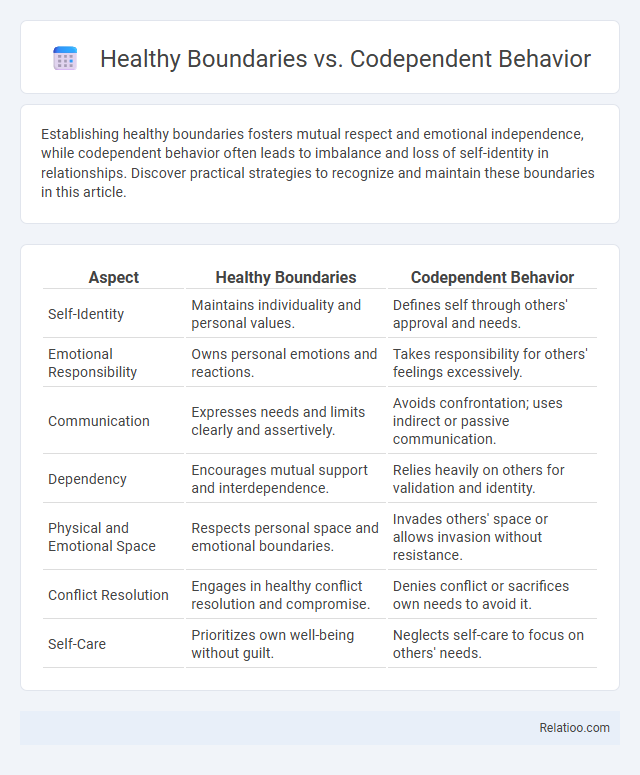Establishing healthy boundaries fosters mutual respect and emotional independence, while codependent behavior often leads to imbalance and loss of self-identity in relationships. Discover practical strategies to recognize and maintain these boundaries in this article.
Table of Comparison
| Aspect | Healthy Boundaries | Codependent Behavior |
|---|---|---|
| Self-Identity | Maintains individuality and personal values. | Defines self through others' approval and needs. |
| Emotional Responsibility | Owns personal emotions and reactions. | Takes responsibility for others' feelings excessively. |
| Communication | Expresses needs and limits clearly and assertively. | Avoids confrontation; uses indirect or passive communication. |
| Dependency | Encourages mutual support and interdependence. | Relies heavily on others for validation and identity. |
| Physical and Emotional Space | Respects personal space and emotional boundaries. | Invades others' space or allows invasion without resistance. |
| Conflict Resolution | Engages in healthy conflict resolution and compromise. | Denies conflict or sacrifices own needs to avoid it. |
| Self-Care | Prioritizes own well-being without guilt. | Neglects self-care to focus on others' needs. |
Understanding Healthy Boundaries
Healthy boundaries define clear limits in relationships, promoting respect, autonomy, and emotional well-being by enabling individuals to communicate their needs and protect their personal space. Codependent behavior often manifests as excessive people-pleasing, difficulty saying no, and sacrificing personal needs to gain approval or avoid conflict. Understanding healthy boundaries is crucial to prevent codependency, as it fosters self-respect and balanced relationships rather than enabling reliance on others for identity or validation.
Defining Codependent Behavior
Codependent behavior involves an excessive emotional or psychological reliance on a partner, often characterized by enabling, people-pleasing, and neglecting one's own needs to maintain the relationship. Unlike healthy boundaries, which promote mutual respect and autonomy, codependent behavior leads to imbalance and emotional exhaustion. Understanding this dynamic is crucial for recognizing how codependency manifests and impacts mental health and relationship stability.
Key Differences Between Boundaries and Codependence
Healthy boundaries involve clear, respectful limits that protect individual autonomy and emotional well-being, while codependent behavior reflects an excessive emotional reliance on others. Codependency often manifests as enabling, people-pleasing, and difficulty asserting personal needs, contrasting with boundaries that encourage mutual respect and independence. Understanding these distinctions is crucial for promoting emotional health and establishing balanced interpersonal relationships.
Signs You Lack Healthy Boundaries
Lacking healthy boundaries often manifests as difficulty saying no, constant people-pleasing, and neglecting personal needs in favor of others, which are key signs of codependent behavior. Codependency involves excessive emotional reliance on others, leading to blurred personal limits and enabling unhealthy patterns. Recognizing these signs helps differentiate between maintaining healthy boundaries and slipping into codependent dynamics.
Red Flags of Codependent Relationships
Codependent relationships often exhibit red flags such as an excessive need for approval, difficulty setting healthy boundaries, and a tendency to prioritize others' needs over personal well-being. Codependent behavior includes enabling harmful actions and sacrificing self-care to maintain the relationship, which erodes individual identity and autonomy. Recognizing these warning signs is crucial to establishing healthy boundaries that promote mutual respect and emotional independence.
Emotional Impact of Codependency
Codependency often manifests as an excessive emotional reliance on others, leading to a loss of personal identity and diminished self-worth. You may experience feelings of anxiety, guilt, and helplessness when your needs are consistently neglected in favor of someone else's approval or validation. Establishing healthy boundaries helps protect your emotional well-being by promoting self-respect and fostering balanced, respectful relationships.
Benefits of Establishing Boundaries
Establishing healthy boundaries enhances your emotional well-being by promoting self-respect and reducing stress associated with codependent behavior and codependency patterns. Clear boundaries help differentiate your needs from others', preventing the enmeshment that often leads to unhealthy reliance and imbalance in relationships. These boundaries empower you to maintain autonomy, foster mutual respect, and create a foundation for healthier, more sustainable connections.
Steps to Set Healthy Boundaries
Setting healthy boundaries involves clearly defining personal limits to protect emotional well-being and foster mutual respect in relationships, contrasting with codependent behavior where boundaries are blurred or ignored. Steps to establish healthy boundaries include recognizing and communicating your needs assertively, being consistent in enforcing limits, and practicing self-awareness to identify when boundaries are being crossed. Developing these skills helps differentiate healthy interdependence from codependency, promoting balanced and respectful connections.
Overcoming Codependent Tendencies
Healthy boundaries protect your emotional well-being by clearly defining limits in relationships, contrasting with codependent behavior where self-worth depends on others' approval. Overcoming codependent tendencies involves building self-awareness, fostering independence, and practicing assertive communication to regain control over your needs and emotions. Developing these skills empowers you to maintain balanced relationships and break free from patterns of excessive reliance.
Building Balanced and Respectful Relationships
Healthy boundaries establish clear limits that promote mutual respect and emotional well-being, essential for balanced relationships. Codependent behavior often involves excessive caretaking and reliance on others for validation, undermining personal autonomy and self-respect. Understanding codependency helps individuals recognize unhealthy patterns and fosters the development of interdependent connections based on trust, respect, and reciprocity.

Infographic: Healthy Boundaries vs Codependent Behavior
 relatioo.com
relatioo.com